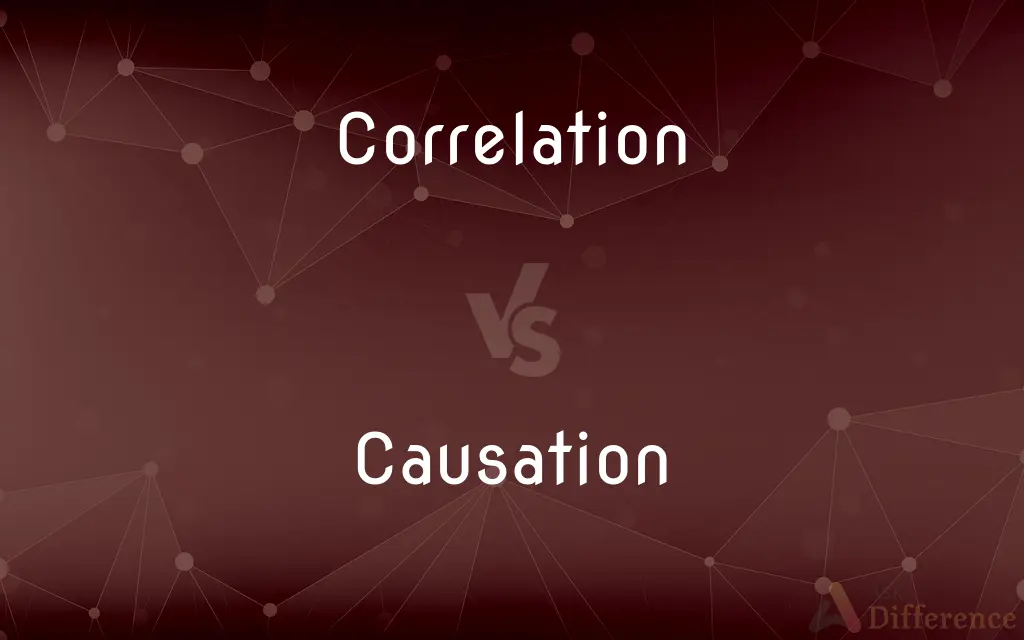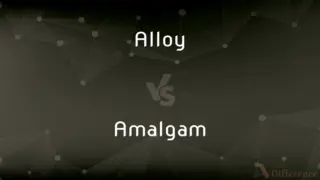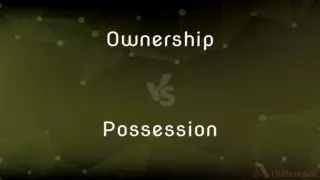Correlation vs. Causation — What's the Difference?
Edited by Tayyaba Rehman — By Fiza Rafique — Updated on November 1, 2023
Correlation indicates a relationship where two variables move together, whereas causation means one event is the result of the other.

Difference Between Correlation and Causation
Table of Contents
ADVERTISEMENT
Key Differences
Correlation refers to a statistical measure that expresses the extent to which two variables change together. However, correlation does not imply that one variable's change is causing the change in the other variable, which is a common misconception. Causation, on the other hand, means that changes in one variable bring about changes in another variable; there is a cause-and-effect relationship.
The value of correlation lies in its ability to predict the presence of one variable when you observe the other. For instance, ice cream sales and drowning rates are correlated because they both increase during the summer months. Causation would suggest that an increase in ice cream sales causes an increase in drowning rates, which is not a true cause-and-effect relationship.
Correlation can be positive (both variables increase or decrease together) or negative (one variable increases while the other decreases). Causation, however, implies a direct connection where one variable's increase or decrease causes the other variable to change in a specific way.
Identifying correlation is often easier and involves statistical analysis to determine the strength and direction of the relationship between two variables. Establishing causation, however, typically requires experimental manipulation where the suspected cause is altered to observe the effect on the outcome variable, a method that seeks to eliminate other potential causes.
Correlation is a vital concept in various fields such as economics, sociology, and psychology for making predictions. Causation is crucial in fields like medicine and chemistry, where understanding the cause of changes is essential for developing treatments or conducting reactions.
ADVERTISEMENT
Comparison Chart
Definition
Measures how two variables move together.
Describes how one variable affects another.
Implication
Does not imply cause and effect.
Implies a cause-effect relationship.
Method of Analysis
Statistical association.
Experimental manipulation.
Nature
Can be coincidental or due to a third factor.
Direct link between cause and effect.
Fields of Use
Prediction and trend analysis.
Establishing mechanisms and treatments.
Compare with Definitions
Correlation
Correlation quantifies the degree to which two variables are related.
The correlation between study time and exam scores is usually strong.
Causation
Causation implies that one event is a result of another event.
Smoking causes an increase in the risk of developing lung cancer.
Correlation
Correlation is based on observation and calculation.
Researchers found a high correlation between smoking and lung cancer incidence.
Causation
Causation establishes a direct link between an action and its effect.
Mandatory helmet laws caused a decrease in cycling-related head injuries.
Correlation
Correlation is neutral regarding whether one thing influences another.
There's a correlation between social media use and loneliness, but the direction is unclear.
Causation
Causation goes beyond correlation by proving a cause-effect relationship.
Scientific research has proven that high cholesterol causes heart disease.
Correlation
In statistics, correlation or dependence is any statistical relationship, whether causal or not, between two random variables or bivariate data. In the broadest sense correlation is any statistical association, though it commonly refers to the degree to which a pair of variables are linearly related.
Causation
The act or process of causing.
Correlation
A relationship or connection between two things based on co-occurrence or pattern of change
A correlation between drug abuse and crime.
Causation
A cause.
Correlation
(Statistics) The tendency for two values or variables to change together, in either the same or opposite way
As cigarette smoking increases, so does the incidence of lung cancer, indicating a positive correlation.
Causation
Causality.
Correlation
An act of correlating or the condition of being correlated.
Causation
The act of causing.
Correlation
A reciprocal, parallel or complementary relationship between two or more comparable objects.
Causation
The act or agency by which an effect is produced.
Correlation
(statistics) One of the several measures of the linear statistical relationship between two random variables, indicating both the strength and direction of the relationship.
Causation
Cause and effect, considered as a system.
Correlation
(algebra) An isomorphism from a projective space to the dual of a projective space, often to the dual of itself.
Causation
The act of causing; also the act or agency by which an effect is produced.
The kind of causation by which vision is produced.
Correlation
Reciprocal relation; corresponding similarity or parallelism of relation or law; capacity of being converted into, or of giving place to, one another, under certain conditions; as, the correlation of forces, or of zymotic diseases.
Causation
The act of causing something to happen
Correlation
A reciprocal relation between two or more things
Causation
Causation requires evidence to suggest that one thing directly affects another.
Vaccination causes immunity to certain infectious diseases.
Correlation
A statistic representing how closely two variables co-vary; it can vary from -1 (perfect negative correlation) through 0 (no correlation) to +1 (perfect positive correlation);
What is the correlation between those two variables?
Causation
Causation is determined through experimental or longitudinal studies.
Long-term studies showed that asbestos exposure causes mesothelioma.
Correlation
A statistical relation between two or more variables such that systematic changes in the value of one variable are accompanied by systematic changes in the other
Correlation
Correlation can indicate a trend or pattern but not a cause.
There is a correlation between the number of firefighters at a scene and the size of the fire.
Correlation
Correlation can be misleading without proper context.
A correlation was noted between ice cream sales and shark attacks, but one does not cause the other.
Common Curiosities
Why is it important to distinguish between correlation and causation?
Distinguishing the two is crucial for proper interpretation of data and for making informed decisions.
What is correlation?
Correlation is a statistical measure that indicates the extent to which two variables fluctuate together.
What does causation mean?
Causation refers to a scenario where a change in one variable is the direct cause of a change in another.
Is correlation valuable if it doesn’t imply causation?
Yes, correlation is valuable for prediction and understanding the relationships between variables.
Can correlation imply causation?
No, correlation alone does not imply causation; further investigation is required to establish a cause-effect relationship.
Does high correlation mean strong causation?
Not necessarily; even a high correlation can be coincidental or due to an unknown third factor.
Can causation exist without correlation?
It's unusual, but causation can sometimes occur without correlation if the effect is consistent regardless of the magnitude of the cause.
What is a spurious correlation?
A spurious correlation is a connection between two variables that appears causal but is due to chance or an external variable.
How can we test for causation?
Causation is usually tested through controlled experiments and intervention studies.
What kind of studies establish causation?
Randomized controlled trials and longitudinal studies are often used to establish causation.
How do you establish causation in economics?
In economics, causation is often established through econometric models and natural experiments.
Can correlation be used as a starting point for causation?
Yes, observed correlations can prompt further research to explore potential causative relationships.
What statistical methods are used to determine correlation?
Pearson's correlation coefficient and Spearman's rank correlation are common methods used to measure correlation.
What is an example of correlation without causation?
An increase in ice cream sales is correlated with drowning deaths, but neither event causes the other.
What’s a real-world implication of confusing correlation with causation?
Mistaking correlation for causation can lead to incorrect conclusions and ineffective policy decisions.
Share Your Discovery

Previous Comparison
Alloy vs. Amalgam
Next Comparison
Ownership vs. PossessionAuthor Spotlight
Written by
Fiza RafiqueFiza Rafique is a skilled content writer at AskDifference.com, where she meticulously refines and enhances written pieces. Drawing from her vast editorial expertise, Fiza ensures clarity, accuracy, and precision in every article. Passionate about language, she continually seeks to elevate the quality of content for readers worldwide.
Edited by
Tayyaba RehmanTayyaba Rehman is a distinguished writer, currently serving as a primary contributor to askdifference.com. As a researcher in semantics and etymology, Tayyaba's passion for the complexity of languages and their distinctions has found a perfect home on the platform. Tayyaba delves into the intricacies of language, distinguishing between commonly confused words and phrases, thereby providing clarity for readers worldwide.













































